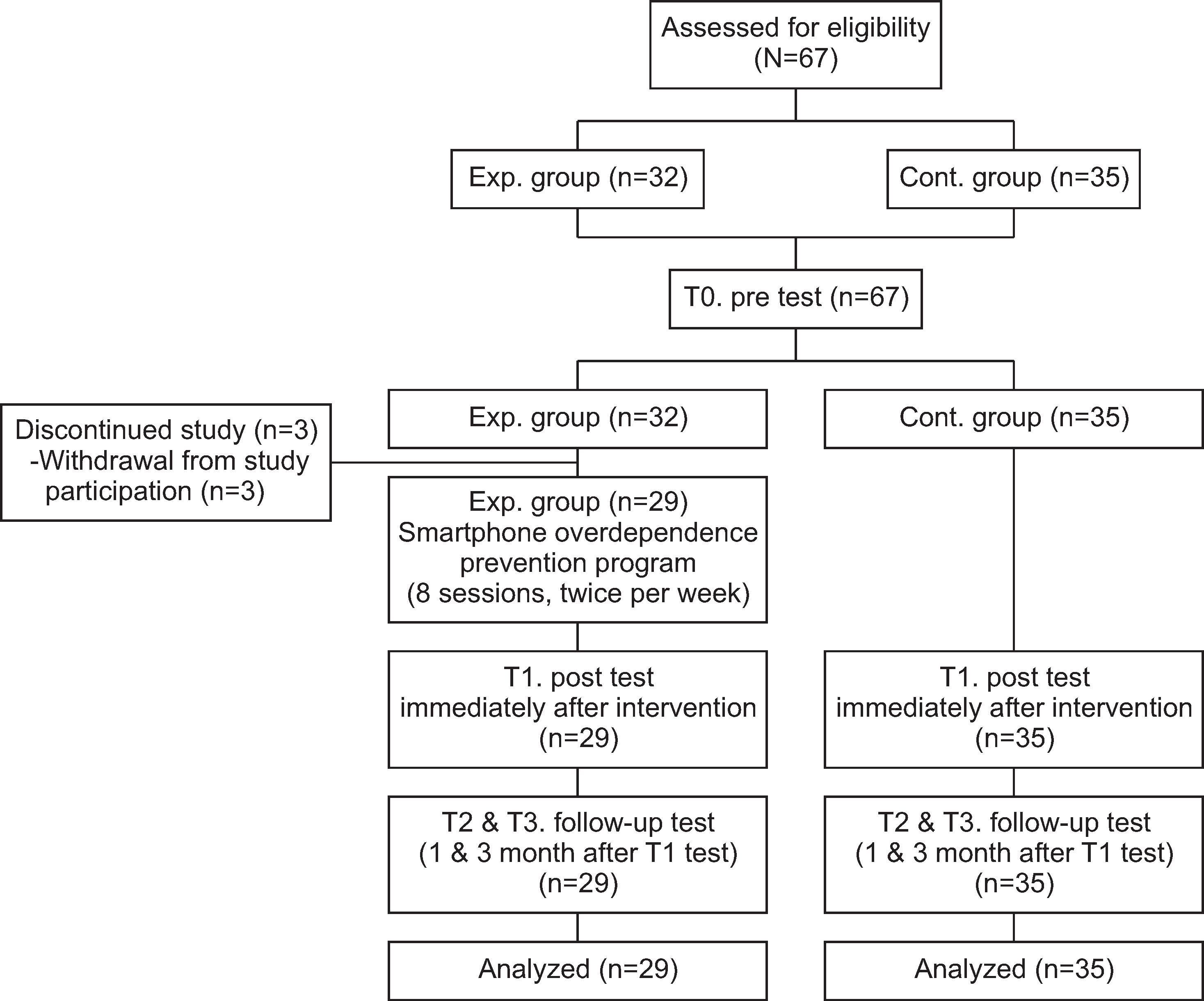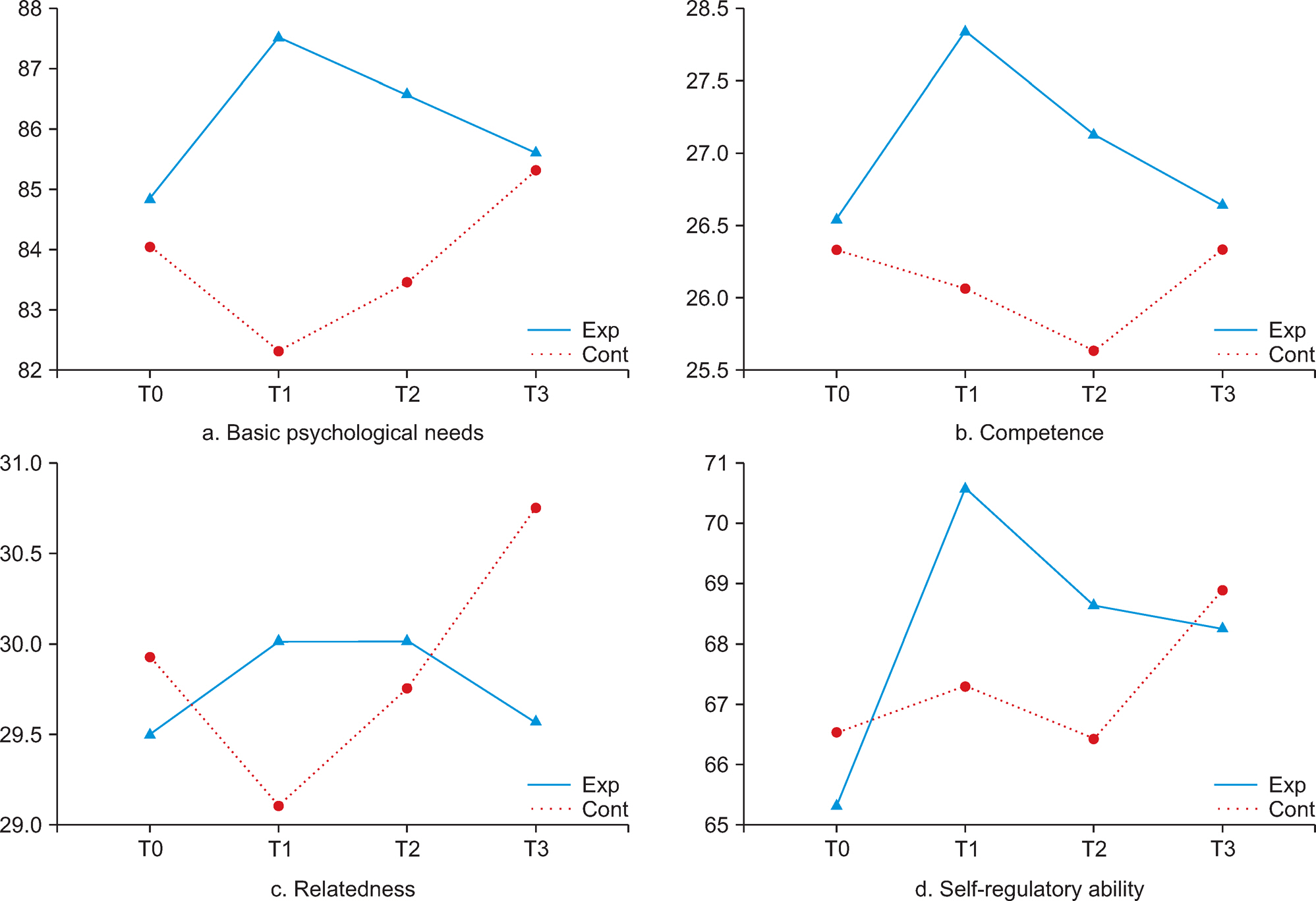J Korean Acad Nurs.
2020 Feb;50(1):116-131. 10.4040/jkan.2020.50.1.116.
Development and Effect of a Smartphone Overdependence Prevention Program for University Students Based on Self-Determination Theory
- Affiliations
-
- 1School of Nursing · Research Institute of Nursing Science, Hallym University, Chuncheon, Korea.
- 2School of Nursing, Hallym University, Chuncheon, Korea. jayamush@hotmail.com
- KMID: 2471255
- DOI: http://doi.org/10.4040/jkan.2020.50.1.116
Abstract
- PURPOSE
This study aimed to develop a smartphone overdependence prevention program for college students based on the self-determination theory (SDT) and evaluate its effectiveness.
METHODS
A non-equivalent control group repeated measures design was used for the study. Participants were 64 university freshmen (experimental group: 29, control group: 35). The developed program consists of eight sessions conducted twice a week. The program was designed to promote autonomy, competence, and relatedness the three elements of the basic psychological needs of self-determination theory. The participants were assessed before the program, immediately after, and 1 and 3 months after the program. Data were collected from April 23 to September 14, 2018 and analyzed by performing a Chi-square test, Fisher's exact test, independent t-test, and repeated measures ANOVA using SPSS/WIN 23.0.
RESULTS
This study showed improvement in the basic psychological needs (F=3.90, p =.010) in the experimental group compared to the control group. Specifically, competence (F=2.93, p =.035), relatedness (F=2.89, p =.045), and self-regulatory ability (F=3.11, p =.028) improved significantly.
CONCLUSION
Study findings indicate that the smartphone overdependence prevention program based on the Self-determination theory could be an effective intervention for improving basic psychological needs and self-regulation ability. Therefore, this program could be an efficient strategy for smartphone overdependence prevention in university students.
Keyword
Figure
Reference
-
1. Samaha, M, Hawi, NS. Relationships among smartphone addiction, stress, academic performance, and satisfaction with life. Computers in Human Behavior. 2016; 57:321–325. https://doi.org/10.1016/j.chb.2015.12.045.
Article2. Poushter J, Bishop C, Chwe H. Social media use continues to rise in developing countries but plateaus across developed ones [Internet]. Washington, D.C. : Pew Research Center;2018. [cited 2018 Dec 19]. Available from:. https://www.pewre-search.org/global/2018/06/19/social-media-use-continues-to-rise-in-developing-countries-but-plateaus-across-developed-ones/.3. National Information Society Agency (NIA). 2016 Digital culture forum policy research report. Daegu: NIA;2016. Dec. Report No.: NIA V-RER-B-16007. p. 251–281.4. Lee SR, Kim HS. The effect of smartphone overdependence on university life adjustment of university students: Focused on the mediating effect of self-efficacy and the moderating effect of social support. Locality and Globality: Korean Journal of Social Sciences. 2017; 41(2):157–184. https://doi.org/10.33071/ssricb.41.2.201708.157.5. Ministry of Science and ICT (MSIT); National Information Society Agency (NIA). 2018 The survey on smart phone overdependence. Daegu: MSIT; NIA;2018. Dec. Report No.: NIA VI-RSE-C-18060. p. 296.6. Choi H, Chung KM. Effects of feedback intervention on decrease of smartphone usage of smartphone addiction risk group of college students. Korean Journal of Clinical Psychology. 2016; 35(2):365–391.7. Lee JW, Lee NY. The effect of stress about campus life and college life adaptation on smartphone addiction of college students. Journal of Learner-Centered Curriculum and Instruction. 2018; 18(2):303–317. https://doi.org/10.22251/jlcci.2018.18.2.303.
Article8. Kwon MS, Lee BY. Relationship among basic psychological needs, smartphone addiction and adaptation to school life in university students. Journal of Korean Public Health Nursing. 2017; 31(3):540–553. https://doi.org/10.5932/JKPHN.2017.31.3.540.9. Lee SH. The college adaptation and smartphone addiction in university enterents: The mediating effect of interpersonal support relationship. Journal of the Korea Academia-Industrial cooperation Society. 2019; 20(4):149–159. https://doi.org/10.5762/KAIS.2019.20.4.149.10. Sawyer SM, Afifi RA, Bearinger LH, Blakemore SJ, Dick B, Ezeh AC, et al. Adolescence: A foundation for future health. The Lancet. 2012; 379(9826):1630–1640. https://doi.org/10.1016/S0140-6736(12)60072-5.
Article11. Kwon MS, Jin J. Exploring the basic psychological needs necessary for the internalized motivation of university students with smartphone overdependence: Applying a self-determination theory. Journal of Korean Academy of Psychiatric and Mental Health Nursing. 2019; 28(1):26–36. https://doi.org/10.12934/jkpmhn.2019.28.1.26.
Article12. Jin J. Experiences of smartphone addiction among university students. Journal of Digital Convergence. 2017; 15(2):421–429. https://doi.org/10.14400/JDC.2017.15.2.421.
Article13. Deci EL, Ryan RM. Facilitating optimal motivation and psychological well-being across life’s domains. Canadian Psychology/ Psychologie canadienne. 2008; 49(1):14–23. https://doi.org/10.1037/0708-5591.49.1.14.
Article14. Deci EL, Ryan RM. The “what” and “why” of goal pursuits: Human needs and the self-determination of behavior. Psychological Inquiry. 2000; 11(4):227–268. https://doi.org/10.1207/S15327965PLI1104_01.
Article15. Kopp CB. Antecedents of self-regulation: A developmental perspective. Developmental Psychology. 1982; 18(2):199–214. https://doi.org/10.1037/0012-1649.18.2.199.
Article16. Gökçearslan Ş, Mumcu FK, Haşlaman T, Çevik YD. Modelling smartphone addiction: The role of smartphone usage, self-regulation, general self-efficacy and cyberloafing in university students. Computers in Human Behavior. 2016; 63:639–649. https://doi.org/10.1016/j.chb.2016.05.091.
Article17. Park JH, Park JH. The relationships among interpersonal relationship anxiety, college adjustment, self-control, and smart-phone addiction in nursing students. Journal of the Korean Data & Information Science Society. 2017; 28(1):185–194. https://doi.org/10.7465/jkdi.2017.28.1.185.
Article18. Jang SH, Ha Y. The effects of self-determination, depression, self-esteem, and impulsivity on smartphone overdependence of college students. Journal of Digital Convergence. 2019; 17(1):269–280. https://doi.org/10.14400/JDC.2019.17.1.269.19. Boumosleh JM, Jaalouk D. Depression, anxiety, and smart-phone addiction in university students- a cross sectional study. PLoS One. 2017; 12(8):e0182239. https://doi.org/10.1371/journal.pone.0182239.
Article20. Wu AMS, Cheung VI, Ku L, Hung EPW. Psychological risk factors of addiction to social networking sites among Chinese smartphone users. Journal of Behavioral Addictions. 2013; 2(3):160–166. https://doi.org/10.1556/JBA.2.2013.006.
Article21. Lan Y, Ding JE, Li W, Li J, Zhang Y, Liu M, et al. A pilot study of a group mindfulness-based cognitive-behavioral intervention for smartphone addiction among university students. Journal of Behavioral Addictions. 2018; 7(4):1171–1176. https://doi.org/10.1556/2006.7.2018.103.
Article22. Jung ES, Son CN. Effects of mindfulness-based cognitive therapy on internet addiction level, anxiety, and stress of college students with Internet addiction. Korean Journal of Clinical Psychology. 2011; 30(4):825–843.23. Yoo HK, Son CN. Effects of ACT on smartphone addiction level, self-control, and anxiety of college students with smartphone addiction. Journal of Digital Convergence. 2016; 14(2):415–426. https://doi.org/10.14400/JDC.2016.14.2.415.
Article24. Choi EM, Kim MS. The effect of motivational interview oriented and cognitive behavioral group counseling for college students with smartphone addiction. Korean Journal of Counseling. 2016; 17(3):169–185.25. Bang JH. The effects of smart phone addiction management application on self-regulation and interpersonal relationship ability of university students. Journal of Korea Entertainment Industry Association. 2016; 10(2):323–337. https://doi.org/10.21184/jkeia.2016.04.10.2.323.
Article26. Lee EH, Park JW. A structural equation model on health be- havior adherence for elders with prehypertension: Based on self-determination theory. Journal of Korean Academy of Fundamentals of Nursing. 2012; 19(3):343–352. https://doi.org/10.7739/jkafn.2012.19.3.343.27. Seo YM, Choi WH. A predictive model on self care behavior for patients with type 2 diabetes: Based on self-determination theory. Journal of Korean Academy of Nursing. 2011; 41(4):491–499. https://doi.org/10.4040/jkan.2011.41.4.491.
Article28. Cho JH. Effects of a motivation-enhanced weight loss program for women with abdominal obesity: Based on the self-determination theory [dissertation]. Seoul: Korea University;2013. p. 1–126.29. Ha YS, Choi YH. Effectiveness of the self-determination theory based a motivational interviewing YOU-TURN program for smoking cessation among adolescents. Journal of Korean Academy of Nursing. 2015; 45(3):347–356. https://doi.org/10.4040/jkan.2015.45.3.347.
Article30. Park GR, Kim HS. Effects of a group counseling integration program on self-determination and internet addiction in high school students with tendency to internet addiction. Journal of Korean Academy of Nursing. 2011; 41(5):694–703. https://doi.org/10.4040/jkan.2011.41.5.694.
Article31. Faul F, Erdfelder E, Lang AG, Buchner A. G*Power 3: A flexible statistical power analysis program for the social, behavioral, and biomedical sciences. Behavior Research Methods. 2007; 39(2):175–191.
Article32. Ryan RM, Deci EL. Self-determination theory: Basic psychological needs in motivation, development, and wellness. New York: Guilford Press;2017. p. 1–756.33. Williams GC, Patrick H, Niemiec CP, Ryan RM, Deci EL, Lavigne HM. The smoker’s health project: A self-determination theory intervention to facilitate maintenance of tobacco abstinence. Contemporary Clinical Trials. 2011; 32(4):535–543. https://doi.org/10.1016/j.cct.2011.03.002.
Article34. Mun SY, Lee BS. Effects of an integrated internet addiction prevention program on elementary students’ self-regulation and internet addiction. Journal of Korean Academy of Nursing. 2015; 45(2):251–261. https://doi.org/10.4040/jkan.2015.45.2.251.
Article35. An NY, Kim JH, Jeong DH, Chang MY, Nam SH, Kong JY. Korean assistive technology satisfaction assessment tool development. Journal of Korean Society of Occupational Therapy. 2014; 22(2):113–124.
Article36. Jeon SH, You YD. A study on the research trend and effects of domestic smart-phone addiction program. Journal of Student Guidance. 2017; 37:263–294.37. Ministry of Government Legislation. The basic youth act [Internet]. Sejong: Ministry of Gender Equality and Family;2018. [cited 2019 Apr 11]. Available from:. http://www.law.go.kr/LSW//lsInfoP.do?lsiSeq=199555&efYd=20180613#0000.38. Lee MH, Kim AY. Development and construct validation of the basic psychological needs scale for Korean adolescents: Based on the self-determination theory. Korean Journal of Social and Personality Psychology. 2008; 22(4):157–174.39. Kuhl J, Fuhrmann A. Decomposing self-regulation and self-control: The volitional components inventory. Heck-hausen J, Dweck CS, editors. Motivation and Self-Regulation across the Life Span. New York: Cambridge University Press;1998. p. 15–49. https://doi.org/10.1017/CBO9780511527869.003.
Article40. Yoon YS. A study on self-regulatory ability of adolescents and its relationship with personality, parenting, behavior problems, and life stress [dissertation]. Seoul: Sookmyung Women’s University;2007. p. 1–112.41. Baker RW, Siryk B. SACQ: Student adaptation to college questionnaire: Manual. Los Angeles (CA): Western Psychological Services;1999. p. 1–79.42. Lee YJ. The non-residential student’s adaptation to college life and career plans [master’s thesis]. Seoul: Ewha Womans University;1999. p. 1–92.43. IEMBIO. The manual of Canopy9 RSA. Chuncheon: IEMBIO;2013. 44. Vansteenkiste M, Simons J, Soenens B, Lens W. How to become a persevering exerciser? Providing a clear, future intrinsic goal in an autonomy-supportive way. Journal of Sport and Exercise Psychology. 2004; 26(2):232–249. https://doi.org/10.1123/jsep.26.2.232.45. Webber KH, Tate DF, Ward DS, Bowling JM. Motivation and its relationship to adherence to self-monitoring and weight loss in a 16-week internet behavioral weight loss intervention. Journal of Nutrition Education and Behavior. 2010; 42(3):161–167. https://doi.org/10.1016/j.jneb.2009.03.001.
Article46. van Deursen AJAM, Bolle CL, Hegner SM, Kommers PAM. Modeling habitual and addictive smartphone behavior: The role of smartphone usage types, emotional intelligence, social stress, self-regulation, age, and gender. Computers in Human Behavior. 2015; 45:411–420. https://doi.org/10.1016/j.chb.2014.12.039.47. Lee K, Kim M. Effects of a rational emotive behavior therapy counseling program on self-efficacy and adjustment to college life for nursing freshmen. The Journal of Korean Academic Society of Nursing Education. 2018; 24(4):443–452. https://doi.org/10.5977/jkasne.2018.24.4.443.
Article48. Hong SH, Kim DR. The relationship between internet addiction level and autonomic nervous system function in college students. Journal of the Korean Data Analysis Society. 2014; 16(3):1699–1714.
- Full Text Links
- Actions
-
Cited
- CITED
-
- Close
- Share
- Similar articles
-
- Effects of On-Campus and Off-Campus Smartphone Overdependence Prevention Programs Among University Students
- Exploring the Basic Psychological Needs Necessary for the Internalized Motivation of University Students with Smartphone Overdependence: Applying a Self-Determination Theory
- Factors influencing smartphone overdependence in university students: an ecological model: a descriptive study
- Mediating Effect of Loneliness on Anxiety and Smartphone Overdependence among Korean Adolescents: Based on the 16th Korea Youth Risk Behavior Survey
- Effect of Loneliness and Depressive Symptoms on Smartphone Overdependence among South Korean Adolescents: A Nationwide Cross-Sectional Study



